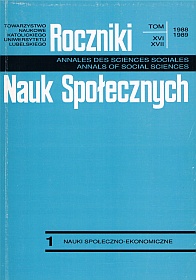Agrarna myśl społeczna w pracach Rady Społecznej przy Prymasie Polski
Abstrakt
The Social Board attached to the Primate of Poland was set up by the Cardinal August Hlond. He was neither an economist nor a lawyer, nor a sociologist, but the social and economic problems were always the focus of his interest. He thought that a reform of the social-economic system of the Second Polish Republic was necessary. In view of the Catholic social teaching, those questions were especially crucial efter the proclamation of the encyclical "Quadragessimo anno". They were bound to be analyzed in the light of the doctrine contained in the encyclical. For that purpose there was set up a Social Board consisting of some outstanding scholars. That Board was also called a Primate Committee, since it worked on his -behalf and with his approval. In view of that he also had responsibility for the publishing of the Board’s declarations.
There is one declaration concerning the village problems which declaration especially deserves our attention. The declaration is a proof that the arbitration of the Social Board was indeed sound and independent. The Board vies able to evaluate properly the social-economic situation of Poland at the time when the Catholic social thought identified the social question with the problem of the worker. In like manner the Board first managed to make a "rural" declaration, and then issue a declaration concerning the enfranchisement of work. A lot of reasons added to the rural problem which was called an agrarian social question. They were the following: low level of the culture and technique of farming, thousands of small and uneconomic farmsteads, the inefficiency /patchwork of fields/ of the internal structure of farms, the overpopulation of villages caused by an insufficient outflow of villagres to towns and to other branches
of national economy.
In order to solve the agrarian problem the Social Board drew up in its declaration the plans of reform. In view of those plans the reform of the system of property did not occupy the first place, yet since it was placed in a strong moral context, much attention was paid to it. In principle, it was supposed to be put into practice by way of parcelling out of land. Eventually, however, a forced dispossession was accepted accompanied by a number of reservations, e.g. it was to be carried out with due indemnification, it was to be quick and only once within bounds set by the condition of a farm, productive capacity of agriculture and a need to feed and defend the country. Apart from parcelling out of greater land property the Board pointed also to other shifts in the economic policy of the state, e.g. development of farming training, drainage, integration, co-operative state-run farms, proper monetary policy, improvement of the means of communication as well as folk industry and handicraft in villages, and the outflow of villagers to towns and industry, creating new, independent farmsteads and empower the farms of no more than two hectares.
The above postulates of solution met a varied reception.
In some cases there were marked divergences. Some people claimed that the proposals were too general and thus can be given various interpretations. Others thought that the Board went beyond its competence in suggesting too detailed solutions. And others claimed that the declaration disregarded social realities, and
yet others stated that the Board promoted interests of a particular class etc. Criticism against the declaration was to a great extent groundless, Nevertheless, it added to the significance of the very document as well as to the authority of its authors.
Copyright (c) 1989 Roczniki Nauk Społecznych

Utwór dostępny jest na licencji Creative Commons Uznanie autorstwa – Użycie niekomercyjne – Bez utworów zależnych 4.0 Międzynarodowe.


